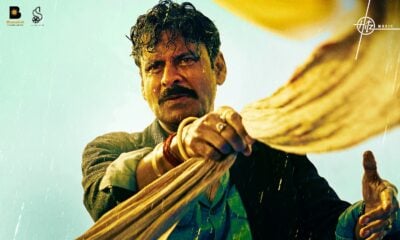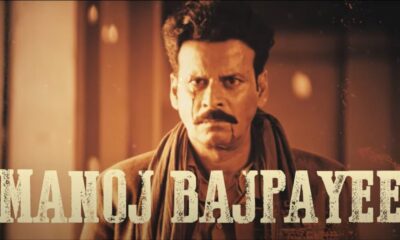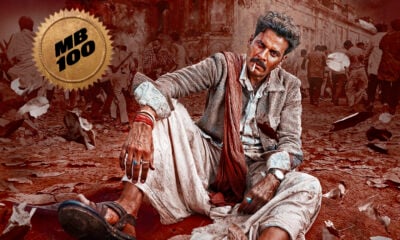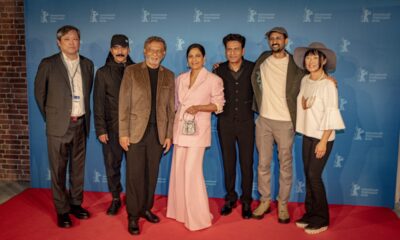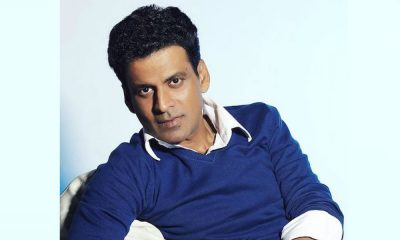Exclusives
Manoj Bajpayee: “If you have the intrinsic strength to become an Institution you do not need to go to any Institution to learn acting”
Manoj Bajpayee spoke about the craft of acting at PIFF Vijay Tendulkar Memorial Lecture.
Published
3 months agoon
By
CB Desk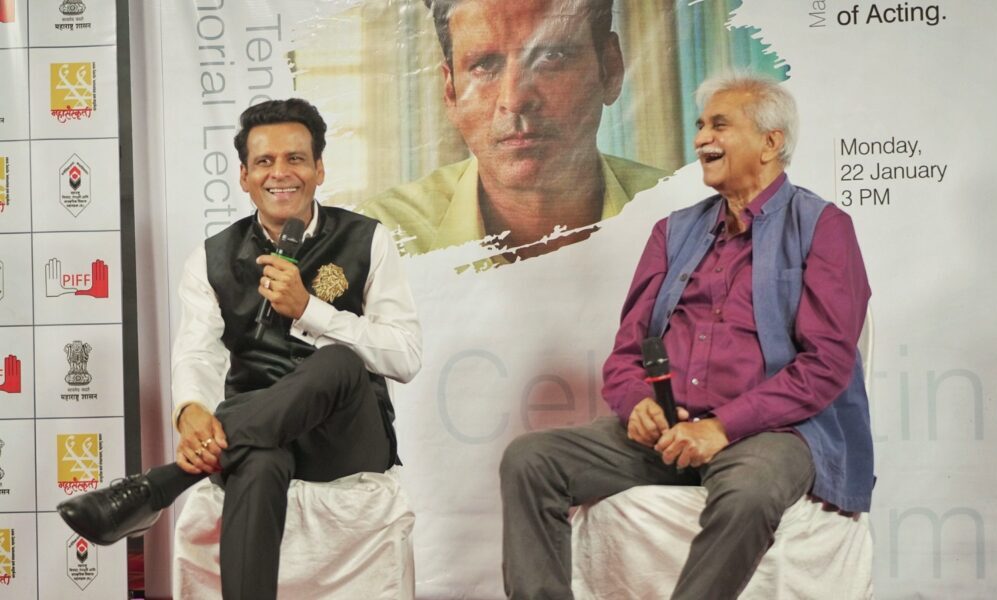
By Jyothi Venkatesh
Actor Manoj Vajpayee advised students that there are many temptations, but one should spend dedicated time to learn acting. He was speaking on ‘The Craft of Acting’ at the Vijay Tendulkar Memorial Lecture at the 22nd Pune International Film Festival (PIFF).
He said, “Learning acting requires patience. I feel like there is no patience today. You go to study acting and someone calls you [for a show on an] OTT platform, someone calls you to do a play. There are many temptations. It distracts you. But acting should be studied properly. Students should give time. Nobody wants to spend time these days. Everyone wants to learn acting quickly in a 5-6 day workshop.”
“Actors, especially those working in plays, should learn at least one form of dance. All actors should constantly read poems aloud. An actor should know his body and voice. Actors should not be too fond of themselves. You should be your own critic, rather than someone else telling you,” he said, adding, “If you have the strength to become an institution, you don’t need to go to any institution to learn.”
Talking about himself and his acting, he said, “Manoj na bhi ho to kya farak padta hai? Main rahu ya rahoo, kirdar rehna chahiye.” (What difference would it make if Manoj does not exist? Whether I remain or not, the character should endure). He shared insights into seeking professional help after the intense shoot of Shool, where he struggled to detach from his character, leading to nightmares. “Later I consulted a doctor and did some experiments on myself. Used yoga. Its positive effect is seen in the role in ‘Pinjar’. You have to be able to step into a role,” he said.
Also read: Sumeet Raghavan gets candid as he celebrates three years of Wagle Ki Duniya
Bajpayee expressed his deep admiration for Vijay Tendulkar, citing plays like Ghashiram Kotwal, and Sakharam Binder as his favourites. “I believe no one in the industry has contributed as creatively and effortlessly as Vijay Tendulkar Sahab, in theatre and cinema,” he said. Bajpaee emphasised Tendulkar’s enduring relevance across generations. Senior actor Mohan Agashe, senior playwright Satish Alekar, and Samar Nakhate were present on this occasion.
Bajpayee spoke about his respect for the festival. During the workshop with Dr. Jabbar Patel, he explored the nuances of his acting career, reflecting on his growing interest in theatre during his time in Delhi and the challenges he encountered along the way.
Explaining the difference between drama and film, he said that an actor is bigger in a drama, but a director is bigger in a film. There are very few actors and directors. Actors are confused. They need to be given direction, for that a director is important. He told the story of how he came to acting. He said, “I come from a small village in Bihar. I was sent to a district school to study. There, I was selected for a poetry competition. When I was in Class 5, I recited a poem and people clapped. There I found myself, found my freedom. In Bihar, dramatists were called Bhand. We used to read stories of Nasruddin Shah, Raj Babbar. Later, when I came to Delhi, I understood what theatre is. I did theatre for 10 years. Every time there was a new experience. We had a group called ‘Act One’. Now that group is closed, because people want instant now. We used to do street plays while doing theatre. I was trying hard for ‘NSD’, but I was not getting admission there. Then Barry John chose me to work, he taught me everything. I am what I am today because of him. Barry experimented with a play for street children. While Shah Rukh Khan was his actor, I was working as his assistant.”
Also read: “Marathi cinema needs to become star-driven,” says Riteish Deshmukh at PIFF
He said, one day Tigmanshu Dhulia told me that Shekhar Kapur had called me, and I got a role in Bandit Queen, but it didn’t benefit my career. Mumbai is a difficult city. Struggled like this for five years. Everything I thought about myself was fake and virtual. But later the role of ‘Satya’ gave me a career.
He said, “I wanted to create my filmography.” So then he did films like Bhosale, Gali Gulia and Aligarh. “Stardom comes and goes, but I pay attention to the script. I prefer new ideas and new directors,” he said.
Talking about his popular OTT series ‘Common Man’, he said that after watching Narcos in America, he realised that OTT is coming to India. “But I decided that if it was different, I would work on OTT and that’s why I did ‘Family Man’.” For that, R. K. Laxman’s Common Man was in front of his eyes.
Bajpayee traced his journey from the early days of street plays to the challenges faced in the evolving landscape of the entertainment industry. He emphasised his interest in theatre grew over time. During his initial days, he worked in a lot of street plays and theatre, which had a lot of political content. As a young individual at that time, he expressed that his focus on being part of theatrical productions held greater significance than any specific political agenda.
Also read: Lantarni Review: Extraordinary and unique!
The workshop shed light on the struggles that fueled Bajpayee’s determination to persevere. He spoke candidly about facing hardships during his early days and how his unwavering conviction became the driving force that propelled him forward. Notably, the film Satya marked a turning point, bringing him unprecedented recognition that surpassed even his wildest dreams.
Bajpayee revealed that, for the past five years, he has been practicing Kriya yoga and other spiritual disciplines to enhance his overall well-being.
Known for his mentorship, Bajpayee guided budding artists, sharing his experiences and lessons learned throughout his prolific career. The workshop concluded on a delightful note with Dr. Patel and Bajpayee sharing an anecdote about how acting is sometimes unexpectedly enhanced by various factors present in the proximity of the set, offering a glimpse into the unpredictable and magical aspects of the craft.
You may like


Baagh Ka Kareja song from Manoj Bajpayee’s 100th film Bhaiyya Ji out now!


Bhaiyya Ji makers unveil teaser of Baagh Ka Kareja song on Manoj Bajpayee’s birthday


Manoj Bajpayee starrer Bhaiyya Ji: First look of the actor revealed!


Manoj Bajpayee starrer The Fable screened at the historic and largest theater Zoo Palast at Berlin International Film Festival


Thithi director Raam Reddy’s The Fable starring Manoj Bajpayee bewitches the audience at the 74th Berlinale International Film Festival


Manoj Bajpayee talks about brand image and success journey in the new season of a Talk Show

